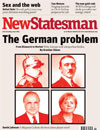
“A spectre is once again haunting Europe – the spectre of German power,” writes historian Brendan Simms in The New Statesman’s cover story, dedicated to “The German problem”. The weekly outlines how the last five years have witnessed a “remarkable increase” in German influence, while Berlin has simultaneously fared well during the economic crisis and stopped the European Central Bank (ECB) from embarking –
on the bond-buying spree that the countries of the bankrupt European periphery so crave, prescribing for them a diet of unpalatable fiscal ‘rules’ instead. […] It is not surprising, therefore, that this period has also witnessed a surge of political and popular Germanophobia across the continent.
Simms believes that throughout most of the last 500 years, Germany has vacillated between being diplomatically too strong or too weak.
Today, Germany is both too strong and too weak, or at least too disengaged. It sits uneasily at the heart of an EU that was conceived largely to constrain German power but which has served instead to increase it, and whose design flaws have unintentionally deprived many other Europeans of sovereignty without giving them a democratic stake in the new order.
The question we face now is this: how can the Federal Republic, which is prosperous and secure as never before, be persuaded to take the political initiative and make the necessary economic sacrifices to complete the work of European unity? One way or the other, the German question persists and will always be with us. This is because, whenever Europe and the world think they have solved it, events and the Germans change the question.”
Meanwhile, historian and columnist Dominic Sandbrook, writes in the Daily Mail that an increasing number of Europeans are arguing that “for the third time in less than 100 years Germany is trying to take control of Europe.” He refers to the comments of former Eurogroup President Jean Claude Juncker, who drew parallels between 2013 and the year before the start of WW1 and warned that the threat of European war still exists. Speaking of the Germans, Sandbrook continues –
If they continue to impose brutal economic strictures on Europe’s peoples, the consequences in terms of social alienation, international disputes and the rise of political extremism could be dramatic. Already we have seen bloody protests against the German economic yoke in Athens, Rome and Madrid. [...] Thanks to this seemingly endless political crisis, Germany is increasingly being seen not as Europe’s economic saviour but its oppressor. [...] Yet the truth is that lashing together the economies of nations as disparate as Portugal, Greece, France, Italy and Germany has served only to inflame old enmities.
Was this article useful? If so we are delighted!
It is freely available because we believe that the right to free and independent information is essential for democracy. But this right is not guaranteed forever, and independence comes at a cost. We need your support in order to continue publishing independent, multilingual news for all Europeans.
Discover our subscription offers and their exclusive benefits and become a member of our community now!











